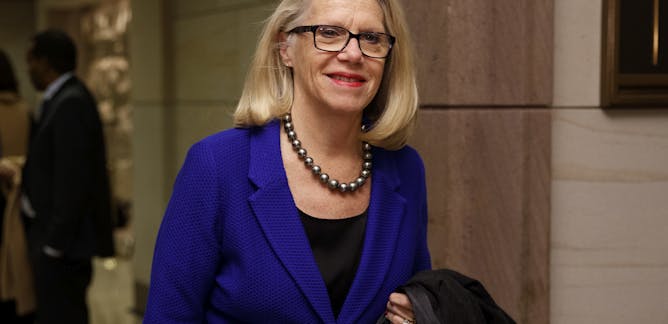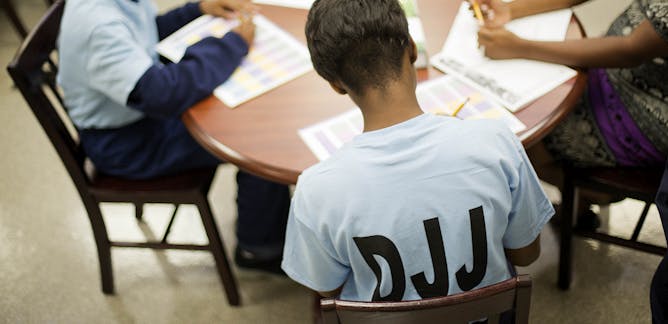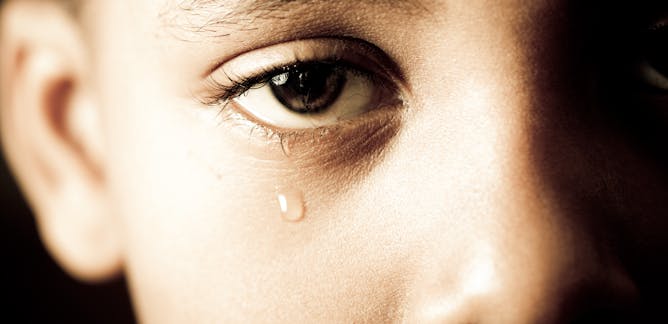|
|
|
Editor's note
|
|
Eighty years ago today, Amelia Earhart was declared legally dead, having been missing in the South Pacific for a year and a half. Ohio State aviation scholars Brian Strzempkowski and Shawn Pruchnicki explain the technologies that pilots, air traffic controllers and airlines use today to avoid getting lost, and to reduce the chances a plane might go missing forever.
Some face-tracking programs claim to be able to read a person’s emotions from a picture. But a new study shows that this software struggles with darker skin. Even when a black person is smiling, the computer assumes that the person pictured is angrier and unhappier than a white person with a similar expression.
Schadenfreude – the pleasure people feel at others’ misfortune – has long vexed psychologists. Psychologist Shensheng Wang and his colleagues have developed a new framework to better understanding schadenfreude, one that views the emotion as an offshoot of a sinister impulse.
|
Jeff Inglis
Science + Technology Editor
|

|
|
Top Stories
|

Amelia Earhart’s Lockheed Model 10-E Electra, with advanced navigation equipment mounted above the cockpit.
USAF/Wikimedia Commons
Brian Strzempkowski, The Ohio State University; Shawn Pruchnicki, The Ohio State University
Eight decades after missing aviator Amelia Earhart was declared dead, technologies still don't quite track every airplane all over the globe.
|

A new study compares the press photos of NBA players.
Isaiah J. Downing-USA TODAY Sports
Lauren Rhue, Wake Forest University
A new study shows that facial recognition software assumes that black faces are angrier than white faces, even when they're smiling.
|

To feel a pang of pleasure at the misfortune of others is to be human.
VixCompaNi/Shutterstock.com
Shensheng Wang, Emory University
Schadenfreude seems to arise out of envy and a sense of justice. But some psychologists believe a darker impulse is at play.
|
Politics + Society
|

Malliga Och, Idaho State University; Shauna Shames, Rutgers University
Republican women face higher barriers to reaching elected office. A GOP allergy to identity politics plays a role too.
| |

Natalia Orendain, University of California, Los Angeles
A neuroscientist explains how detention can affect a developing mind, as a new law in California sets the highest age limit in the US for minors to be held criminally responsible, at age 12.
|
|
|
Health + Medicine
|

Arash Javanbakht, Wayne State University
As the new year gets underway, millions will make resolutions. The author explains why resolving to live in accordance with the way humans have evolved could go a long way to increasing happiness.
| |

Sharona Hoffman, Case Western Reserve University
Insurance companies sometimes try to cut costs by substituting less expensive drugs for a specific drug prescription. That's raising problems in many cases, and actually causing harm.
|
|
|
Science + Technology
|

Daniel Sarewitz, Arizona State University
Almost two years in, Trump finally has a science adviser in position. History demonstrates that the role is at least as political as it is scientific.
| |

Amanda Cavanagh, University of Illinois at Urbana-Champaign
Many of the crop plants that feed us waste 20 percent of their energy, especially in hot weather. Plant geneticists prove that capturing this energy could boost crop yields by up to 40 percent.
|
|
|
Arts + Culture
|

Maria Meza, a 40-year-old migrant woman from Honduras, runs away from tear gas with her 5-year-old twin daughters in front of the border wall in Tijuana, Mexico.
Kim Kyung Hoon/Reuters
Nicole Smith Dahmen, University of Oregon
Each day, readers are bombarded with shocking, inspiring and informative images. In their overwhelming volume, they can be easily forgotten. Nonetheless, some do rise to the top.
|
Environment + Energy
|

Marianne Sullivan, William Paterson University; Chris Sellers, Stony Brook University (The State University of New York); Leif Fredrickson, The University of Montana; Sarah Lamdan, CUNY School of Law
Data gathered from EPA reports, staffers and retirees show the Trump administration has brought fewer environmental enforcement actions to conclusion and deferred more to states.
| |

Thomas Giachetti, University of Oregon
Research into volcanic activity in the waters off Indonesia shows how active this region is and how destructive landslide-caused tsunamis can be.
|
|
|
Economics + Business
|

Barry Eichengreen, University of California, Berkeley
While the euro's survival for two decades is evidence of its success, it was born with fundamental problems that have weakened it, leading to near-constant crisis.
| |

Daniele Bianchi, Warwick Business School, University of Warwick
Bitcoin has been on a downward ride over the last year, steadily trading below US$4,000. It could get worse.
|
|
|
Education
|

Eric J. Barron, Pennsylvania State University
Rather than bypass college to pursue their entrepreneurial dreams, members of Generation Z are increasingly partnering with universities to launch new startups, a university president says.
| |

David Schonfeld, University of Southern California
When it comes to helping students who've lost a loved one, educators often don't know what to do or say. A pediatrician offers insights on how schools can support children in grief.
|
|
|
| |
| |
| |
| |
| |
| |
|
|
|
|
|
|
|